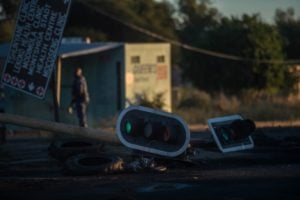Botswana didn’t close its border with South Africa due to Mahikeng unrest
This article is more than 6 years old
Johannesburg mayor Herman Mashaba shared an “interesting observation” with his more than 100,000 Twitter followers over the weekend.
“Mahikeng erupts into violent protests, Government of Botswana immediately closes its borders,” he posted on the social media platform. “When neighbo[u]ring countries & other parts of the world experience similar problems, South African opens its borders.”
Mahikeng, capital of South Africa’s North West province which borders Botswana, erupted in violence last week. Residents took to the streets, calling for the removal of premier Supra Mahumapelo, accusing him of corruption and poor service delivery.
Asked how Mashaba knew that the Botswana/South Africa border was closed, Johannesburg mayoral communications director, Luyanda Mfeka, said he would respond “as soon as possible”, but has not yet done so. (Note: We will update this report as soon as he does.)
 A traffic light that was vandalised during protest in Mahikeng in South Africa's North West province on 20 April 2018. Photo: AFP/MUJAHID SAFODIEN
A traffic light that was vandalised during protest in Mahikeng in South Africa's North West province on 20 April 2018. Photo: AFP/MUJAHID SAFODIEN
A public relations officer in Botswana’s ministry of immigration, Hannah Ramorojo, told Africa Check the border “was never closed”. This was also confirmed by Clayson Monyela, spokesman for South Africa’s department of international relations and cooperation.
South Africa’s neighbour did, however, warn its citizens to be cautious when travelling to Mahikeng, suspending trips if possible.
“We received information from the South African border... to say there are protests in Mahikeng and that the roads are blocked,” she said. “We then sent communication locally to caution Batswana.”
Ramojoro said the Botswana government will await official confirmation of peace before retracting the travel advisory to its citizens.
“Mahikeng erupts into violent protests, Government of Botswana immediately closes its borders,” he posted on the social media platform. “When neighbo[u]ring countries & other parts of the world experience similar problems, South African opens its borders.”
Mahikeng, capital of South Africa’s North West province which borders Botswana, erupted in violence last week. Residents took to the streets, calling for the removal of premier Supra Mahumapelo, accusing him of corruption and poor service delivery.
Asked how Mashaba knew that the Botswana/South Africa border was closed, Johannesburg mayoral communications director, Luyanda Mfeka, said he would respond “as soon as possible”, but has not yet done so. (Note: We will update this report as soon as he does.)
SA’s neighbour warned residents
 A traffic light that was vandalised during protest in Mahikeng in South Africa's North West province on 20 April 2018. Photo: AFP/MUJAHID SAFODIEN
A traffic light that was vandalised during protest in Mahikeng in South Africa's North West province on 20 April 2018. Photo: AFP/MUJAHID SAFODIENA public relations officer in Botswana’s ministry of immigration, Hannah Ramorojo, told Africa Check the border “was never closed”. This was also confirmed by Clayson Monyela, spokesman for South Africa’s department of international relations and cooperation.
South Africa’s neighbour did, however, warn its citizens to be cautious when travelling to Mahikeng, suspending trips if possible.
“We received information from the South African border... to say there are protests in Mahikeng and that the roads are blocked,” she said. “We then sent communication locally to caution Batswana.”
Ramojoro said the Botswana government will await official confirmation of peace before retracting the travel advisory to its citizens.

Add new comment